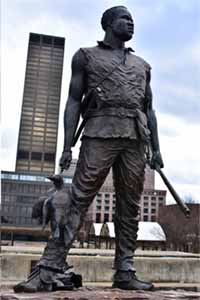York
Updated: February 3, 2026

York was an enslaved man owned by William Clark, the only African American member of the Lewis and Clark Expedition, and a key contributor whose life before and after the journey was far harsher than older popular accounts suggested.
Status and role on the expedition
York was born into slavery on the Clark family plantation in Virginia around 1770-1775 and was likely the son of another enslaved man known as "Old York." He grew up as Clark's personal servant and body servant, accompanying him through moves from Virginia to Kentucky and later to what became Missouri.
On the Corps of Discovery (1804-1806), York was the only Black participant and the only one who was enslaved, yet he took part in the entire journey and performed the same demanding labor as other expedition members. Contemporary accounts describe him hunting, managing horses and boats, helping make camp, and sharing many of the physical risks of travel, not simply attending to Clark's personal needs.
Most historians agree that York was among the first African Americans to cross the Continental Divide and to reach the Pacific coast overland, though strictly speaking at least one or two Black men traveled earlier by sea with maritime expeditions. During critical votes-such as where to winter on the Pacific coast-the Corps allowed York to express his preference alongside Sacagawea, an informal but symbolically important moment showing his de facto role as a team member despite his legal status as property.
Interactions with Native nations
Lewis and Clark's journals and later commentary emphasize Native peoples' fascination with York's appearance. Many Indigenous observers had never seen a man with dark skin like his, and they sometimes rubbed his skin or hair and associated his presence with spiritual or medicinal power, leading to nicknames that have been translated as "Big Medicine" or similar phrases.
In some encounters, this curiosity appears to have helped the expedition, as York's presence became a point of interest and goodwill in diplomatic meetings. Scholars now stress that such reactions varied between nations and moments, and that the surviving descriptions come almost entirely from Lewis and Clark, who filtered Native responses through their own expectations and racial attitudes.
Yorks Islands and other place names
Between modern Townsend and Three Forks, Montana, the Missouri River splits around a group of islands that Clark labeled "Yorks 8 Islands" on his 1805 map in honor of York. That name, now standardized as "Yorks Islands," was not made official by the U.S. Board on Geographic Names until 2000, nearly two centuries after the expedition.
Clark also applied York's name to a tributary of the Yellowstone River, "York's Dry Creek," during the return journey in 1806, but this name fell out of use and the stream is now known as Custer Creek. The belated formal recognition of Yorks Islands is often cited in recent scholarship as an example of how York's contributions were long minimized in public memory and only recently incorporated into official geography and commemorations.
After the expedition: freedom and conflict
The older story that York quickly gained his freedom by 1809 and settled near his wife is no longer accepted as firm fact by most historians. Primary evidence from Clark's own letters shows that York asked persistently for manumission after the Corps returned in 1806, hoping to live with his wife in Kentucky, but Clark repeatedly refused.
Clark described York as "insolent and sulky," admitted to giving him a "severe trouncing," and punished him with confinement and forced labor when York continued to press for freedom. By 1809-1810 Clark was hiring York out to harsh enslavers in Kentucky and considering selling him, and documents indicate that York remained enslaved at least into the mid-1810s as a wagon driver.
Years later, in an 1832 conversation with writer Washington Irving, Clark claimed that he eventually freed York, set him up in a wagon-freighting business, and that York later died of cholera while trying to return to Clark. Modern scholars treat this story cautiously: there is no independent documentation of York's manumission, business, or death, and Clark's retrospective account appears self-serving and racially biased, so the exact circumstances and date of York's death remain uncertain.
Modern reassessment and memorials
Recent work in public history and Black studies emphasizes York's agency and skill rather than depicting him mainly as Clark's loyal servant. Historians highlight his essential role in hunting, labor, diplomacy with Native nations, and in the day-to-day survival of the Corps, even though he received no pay and no formal recognition at the time.
In the late twentieth and early twenty-first centuries, York has been commemorated with statues, place-name restorations, and educational programs, including monuments in Louisville and Portland and expanded interpretation at national historic sites. This newer scholarship and public commemoration together reflect a broad consensus that York was a central, indispensable member of the expedition whose life story also reveals the deep injustices and contradictions of slavery in the early United States.
Test your knowledge. Take the York quiz.
Updated: February 3, 2026

